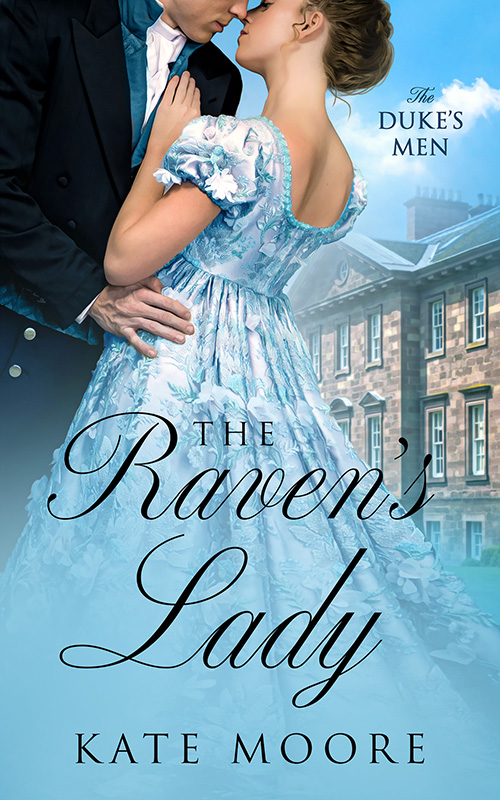Thanks for joining me here today. If we’ve not met, I’m Kate Moore, a fellow reader of Romance and also a writer. I write novels about falling in love standing up, mostly fully clothed, in the midst of family and friends.
It sounds ordinary, but, of course, there is nothing ordinary about falling in love. It changes our consciousness of the world around us and of who we are. As readers, when we experience Romance novels through the characters, we, too, fall in love again. It’s a great ride, the kind you stand in line for at the amusement park just to experience once, and then dash to the end of the line, no matter the wait, to experience again.
Today, Tule releases my twenty-first Romance, The Raven’s Lady. It’s a story about a determined man’s pursuit of happiness and a spirited heroine’s rediscovery of it.
Now wealthy, Sir Adrian Cole was once Raven, a nameless lost boy on the streets of London. (Think of the film Lion.) In Regency and post-Regency London, if you don’t know where you come from, how can you know where you belong? And Raven wants to belong. He’s over being out in the cold looking in. When his clever invention of a better fire engine and his courage in battling the great fire that destroyed the Houses of Parliament catapult him to a knighthood, he’s suddenly in the midst of the cream of London society, the ton. There he’s dazzled by an earl’s daughter and sets out to win her and, he thinks, happiness. Because he’s determined and single-minded, he won’t let anything stop him. But his sense justice makes him stand up for the underdog and brings him into conflict with the very people from whom he seeks acceptance.
Lady Cassandra Lavenham, orphaned daughter of a duke, has had a falling out with happiness. Happiness deserted her, left her high and dry without a backward look when her first love wed another and an accident left her with a permanent injury. Now she’s desperately trying to keep the crumbling roof of Verwood Park over the heads of herself, her novelist aunt, and her imperious grandmother. Leasing Verwood to wealthy Sir Adrian Cole seems the perfect solution. But Raven is not the elderly gentleman tenant Cassie imagined. He’s young, devilishly handsome, and has an almost unconscious habit of coming to the aid of people she cares about. Cassie can’t decide whether she’s more infuriated by or attracted to him, but it doesn’t matter as he has set his heart on a cold beauty.
Writing this story made me think about variations in story endings depending on whether the hero/heroine gets what they want and whether they still want it. Joni Mitchell’s line about Paradise comes to mind–Don’t it always seem to go that you don’t know what you’ve got ’til it’s gone... How Raven and Cassie overcome missteps and blind spots on their road to unexpected happiness is their story. Read an excerpt below.
I like to think of reading Romance as a kind of workout for a happy heart. It’s the best kind of workout because we make only a little effort, a little bend of the elbow, a little flick of the wrist, some rapid eye movement, and some working of our smile and laugh muscles for a great reward in renewed energy and the joy of being alive. So, I hope you’ll reach for The Raven’s Lady and start working your happiness muscles. For a chance to receive an e-book or print copy (USA only), join me at the Tule Book Club on FB today.
Cheers,
Kate
Excerpt:
“Stop.” She sneezed, and he handed her his handkerchief. “You are getting ahead of yourself,” she said. “Even if this house can be made livable, to get your lease you have to find your way into Grandmama’s good graces first.”
“You don’t think offering her a trainer will help?”`
“It might, but perhaps there’s something else about you that would …”
“Overcome the taint of trade in iron and glass? I assure you I have been welcome this winter in all the loftiest houses in Mayfair.”
“Have you?” Her dark brows went up. “Somehow I don’t think unbridled conceit will be a winning strategy with Grandmama.”
Raven choked. “Unbridled conceit?”
“Apparently, you have acquired boundless confidence along with your fortune. Is that how you earned your knighthood?”
“I earned…”
She sneezed again, and Raven took hold of her elbow and led her through the house and out a door in the kitchen into a small courtyard. She leaned against a low stone wall overlooking a field, and sneezed a few more times. He waited.
“Speaking of conceit…” he began. “I wager there’s plenty of conceit in a household that can’t afford coal or servants or new gowns for a lady, but that pretends to be above leasing a portion of the property to a respectable man of means.”
Her eyes flashed up at him. She was taller than Amabel, and fearless and frank in her bearing with no illusion of feminine frailty, and, he suspected, she was about to let him have it. Then another sneeze took her.
“Oh bother,” she said, recovering. “It’s no use getting angry. The truth is that leasing Verwood is the practical solution to our family’s dilemma. It is just that the littleness of a drawing room only twenty feet across is a strong a reminder of our circumstances.”
“Will her grace care so very much about the house if the stables prosper?”
“No,” she admitted with a laugh. “You’re right. She will hardly spend any time here. But first we have to reconcile grandmama to you as a tenant.”
Raven liked that we. It meant she was going to be practical. But he didn’t understand the problem exactly. “My money’s not suitable for the ladies of Verwood?”
“Your money’s fine. It’s you. You aren’t what we …” She waved a hand over his person. Even without a valet Raven had dressed himself to exacting London standards, so he couldn’t think what caused her to object to him.
“What?”
“Expected.” She blew out a sigh. “The tenant we imagined was … old, quiet, settled… married, content to drive a gig about the lanes or shoot a few pheasants in season. You’ll be noticed.”
“You didn’t tell Trimley that you required any of these qualities in a tenant.”
“That’s because the Sir misled me. I thought Sir Adrian Cole must be a merry old nabob returned from India, or a mill owner bringing his wife and daughters from some blighted northern town to live in the healthful south. How did you acquire a ‘sir’ at your age?”
“My age?” He no longer thought of himself as a youth. Dick Crockett was a youth. “I was knighted for making fire engines.”
“Fire engines?” The perplexed look on her face made him laugh. “When I joined my grandfather’s business, he asked me what I wanted to make. His fortune came from cannons for the army and the navy, but demand had slowed. I started with glass. Glass makes money, but it doesn’t excite my grandfather. Then I suggested we make better fire engines, engines that can pump more water, at a faster rate. He liked that idea.”
“And a better fire engine led to a knighthood?”
“Five engines. Ours were deployed against the fire in the Houses of Parliament last October.”
“You were there, fighting the fire?”
“Yes.” His reputation as a man who fought the palace blaze meant he’d been pointed out in ballrooms all winter. Whispers had followed him. Women had looked at him with a sort of awe, and some women, with a kind of hunger.
Lady Cassandra gave him a shrewd assessing glance. Plainly, his firefighting did not stir any particular admiration in her.
He laughed and pushed away from the wall. “Not impressed? What about showing gratitude for sending disagreeable Hugh on his way?”
“I am grateful. Whatever your motive for that act, it was a kindness to Dick Crockett.”
“Motive? You suspect me of having a motive for helping a fellow who was getting the wrong end of an unfair fight?”
“You threw money at a problem and made it go away. That’s hardly heroic.”
“Does my money have to be heroic to rescue Verwood from insolvency?”
She took a deep breath. “As I said before, it’s not the money, it’s you we need to present as an unobjectionable tenant.”
He shook his head. “You would prefer a tenant in his dotage who fought at Trafalgar or Waterloo?”
She grinned at him and shrugged her shoulders. “Even a minor victory like Navarino would do. Mostly, it would help if you could manage to be forty or fifty and a bit more … staid.”
“That,” he said, “is beyond my power. I am staying at the Crown and can return directly if you think of any way of gaining her grace’s approval.”
“Oh, the Crown. Which horse did they give you?”
“Apollo.”
Her brows went up again. “Then you have made an impression. Apollo is the Crown’s best horse, and Grandmama likes him. You must come for tea.”
“Tea? Why isn’t your solicitor handling the lease for you?”
“Because women can manage their own affairs,” she snapped.
“Tea it is, then, if you agree to support me as an acceptable tenant for Verwood, for my service to the nation.” Raven stuck out his hand to seal the bargain. He would have Trimley seek out Verwood’s solicitor and find out the reason for leaving him out of the lease plans.
She cast him a brief puzzled glance, then her hand met his. The sensation of it brought him up short, her small delicate hand in his larger one. He had been thinking of her as this forthright, strong-willed person, managing business affairs women usually left to men. The soft hand threw him off for a moment.
She withdrew her hand, and he recovered. It was Amabel he should be thinking of, not this odd, prickly independent woman.
About the Author.
 A Californian, Kate taught English lit to generations of high school students, who are now her Facebook friends, while she not-so-secretly penned Romances. In Kate’s stories an undeniable mutual attraction brings honorable, edgy loners and warm, practical women into a circle of love in Regency England or contemporary California. A Golden Heart, Golden Crown, and Book Buyers Best award winner and three-time RITA finalist, Kate lives north of San Francisco with her surfer husband, their yellow Lab, black cat, toys for visiting grandkids, and miles of crowded bookshelves.
A Californian, Kate taught English lit to generations of high school students, who are now her Facebook friends, while she not-so-secretly penned Romances. In Kate’s stories an undeniable mutual attraction brings honorable, edgy loners and warm, practical women into a circle of love in Regency England or contemporary California. A Golden Heart, Golden Crown, and Book Buyers Best award winner and three-time RITA finalist, Kate lives north of San Francisco with her surfer husband, their yellow Lab, black cat, toys for visiting grandkids, and miles of crowded bookshelves.







By posting a comment, you consent to have your personally identifiable information collected and used in accordance with our privacy policy.